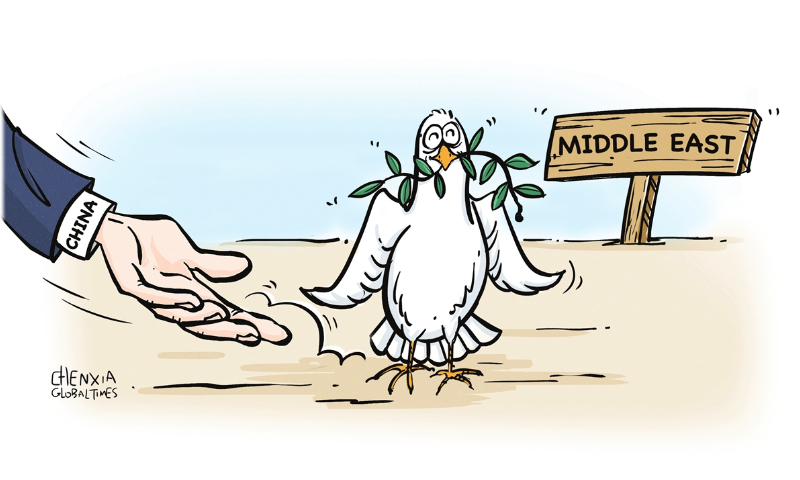
Illustration: Chen Xia/GT
At the invitation of Chinese President Xi Jinping, Palestinian President Mahmoud Abbas is paying a state visit to China from Tuesday to Friday. As an old and good friend of the Chinese people, this is President Abbas' fifth visit to China, and he is also the first Arab head of state hosted by China this year. It is widely believed that the traditional friendly relations between China and Palestine will reach a new level. In addition to bilateral cooperation, the Palestinian issue is expected to be one of the topics discussed by the two heads of state. Against the backdrop of a wave of reconciliation in the Middle East, there is great anticipation for whether this visit will bring more hope for peace in the region.
According to the Palestinian side, Abbas' visit will focus on the "Arab Peace Initiative," and China is expected to continue playing a greater role in the Palestine-Israel issue. It is well known that China has been tirelessly advocating for the early achievement of a comprehensive, just, and lasting solution to the Palestinian question for many years. China has put forward its own proposals and expressed its welcome to negotiators from both sides of Palestine and Israel to hold direct talks in China. The handshake between Saudi Arabia and Iran, the "arch-rivals" in the Middle East, in Beijing showed the world the great appeal of the Global Security Initiative. After that, people have more room for imagination on whether the Palestinian issue has new approaches for resolution and whether Palestine and Israel will break the assertion that "the willingness and ability to reach a historic compromise are almost zero."
The Palestinian issue is the core of the Middle East issue, and it is related to the peace and stability of the region and international fairness and justice. From World War II to the Cold War, and then to the 21st century, Middle East has experienced multiple wars and countless conflicts. The casualties and humanitarian crises caused have been shocking. It is worrisome that the peace process between Palestine and Israel has been stagnant since peace talks broke off in 2014, and the "Quartet mechanism" composed of the United Nations, the US, Russia, and the European Union has existed in name only in recent years. In May 2021, the largest-scale armed conflict since 2014 broke out between Palestine and Israel, resulting in the deaths of over 200 Palestinians, including dozens of children, and at least 12 deaths on the Israeli side, including two children. Violence also erupted between Palestine and Israel in April and May this year. To effectively accelerate the Palestine-Israel peace process tests and verifies international conscience and morality.
We all know that Washington often talks about justice and human rights and loves to stand on the moral high ground to accuse others, but it is deeply culpable in the Palestinian issue.
As a superpower, the US has played a very negative role in the Palestinian issue. It not only repeatedly obstructed the UN Security Council from speaking out on this issue, but also strongly favored one side, exacerbating the conflict. The Middle East peace plan proposed during Trump's term was even considered as "a mark of shame" rather than an agreement. A recent poll showed that 80 percent of Palestinians welcome Chinese offer to mediate in the Palestine-Israel conflict, while the US is seen as the least favorite option, which shows the public champions justice.
We also noticed that some American media, while showing little interest in the Palestinian issue, viewed Abbas's visit to China through the lens of "US-China competition," claiming that the trip signaled China's "broader diplomatic ambitions" in the Middle East and trying to portray it as part of "US-China confrontation." This argument is not only narrow-minded and short-sighted, but also shows that in the eyes of American elites, this major event concerning peace, stability, fairness and justice is just a tool for competition. If some American elites feel that they are "powerless" in the Middle East today, it is obviously due to their own policy problems, not related to China.
Just as other security issues in the Middle East, China has no self-interest in the Palestinian issue and is making efforts to prevent the Palestinian issue being marginalized in the complicated and changing regional and international situations and promote the resolution of the issue with a sense of justice. President Xi Jinping put forward China's "four-point proposal" for resolving the Palestinian issue during his meetings with President Abbas on May 6, 2013 and July 18, 2017. After the clash between Palestine and Israel broke out in 2021, China, holding the rotating presidency of the UN Security Council, pushed the Security Council to hold five meetings on the Palestinian issue and ultimately issued a presidential statement. In addition, China also proposed three routes to implement the "two-state solution," and held a seminar for peace activists from Palestine and Israel. So far, five Chinese special envoys to the Middle East have visited Palestine, Israel, Egypt, Jordan and other related countries in the region to mediate the Palestinian-Israeli conflict.
Palestine and Israel are neighbors that cannot be moved away from each other. There are no winners in conflicts, and no losers in peace. China's sense of responsibility and morality in maintaining world peace and development is evident to the international community. This is also the reason why China can always make friends in the Middle East and around the world. People see that whether it is Saudi Arabia and Iran, Russia and Ukraine, Palestine and Israel, these countries who are against each other, are both China's partners and friends. This is fundamentally the result of China's diplomatic goal of building a community with a shared future for mankind, and it will further promote the concept of "shared destiny" to yield fruits in more places. We also expect President Abbas' visit to bring more good news for peace to the Middle East.




